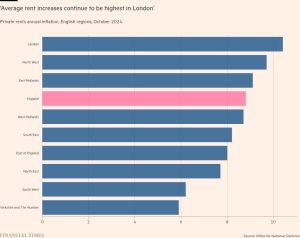More Chinese women graduate but jobs and equal pay still elude them
Unlock the Editor’s Digest for free
Roula Khalaf, Editor of the FT, selects her favourite stories in this weekly newsletter.
It took accountancy graduate Yang Jiao four months to find a job last year in what was one of the toughest job markets in years. It took many of her 100 female classmates at Sichuan University even longer.
“Many female students spent six months or longer after graduation before landing a job,” she said, as the economy, laid low by a property crisis, struggled to gain momentum after the pandemic.
By contrast, most of the 20 men on her course — even those with poor grades — found work easily, she said. “While female students in general study harder and score better in exams, they are at a disadvantage in job hunting,” she said.
Yang’s experience speaks to one of the biggest problems facing China’s female graduates: while more and more women are graduating from university, it is often much harder for them to get a step on the ladder.
In the UK and US, female students also outnumber men. But the gap is particularly acute in China. In 2008, women overtook the number of men enrolled at university for the first time and the gap has risen every year since 2010. In 2022, 63 per cent of students enrolled in undergraduate courses were women, according to the latest statistics from the Ministry of Education.
Chinese state media has celebrated the high levels of female participation at university as evidence of China’s progress on gender equality.
Last year, state broadcaster CCTV pointed to the high female participation at university as evidence that “women’s right to receive higher education has been effectively guaranteed”, aligning with other “continuous improvement . . . in women’s rights and interests”.
“The rising attendance reflects how young women are much more aware of how education can be a boost for them. That is especially true for young women in the countryside, where it is more acceptable for men to go straight into work and not pursue higher education,” said Derek Hird, an expert in class and gender in China at Lancaster university.
But even though women outnumber men at university, they are under-represented in science, technology, engineering and maths courses. Some courses, such as navigation and mining, are deemed unsafe or inappropriate and they are discouraged from applying. The courses with the highest female attendance include primary education, home economics, psychology, women’s studies and foreign languages, according to independent data provider Gaokao.
“If you drill down into the numbers, the science and engineering schools, where students go on to have higher-paid jobs, have many more male students,” said Hird.
In part as a result, greater participation in higher education has not translated into equal pay in the workplace. There are no official government statistics on the gender pay gap. Average monthly pay for women is Rmb8,958 ($1,265), 13 per cent lower than for men, according to data from recruitment platform Zhaopin.
With China’s growth rate slowing, higher education is not a guaranteed ticket to employment, especially with rising joblessness among the young. The rate of unemployment of young people in urban areas was 17.1 per cent in July. Lin, a 26-year-old teacher in Shenzhen, said: “In my profession, if a man with average skills is interviewed, he will advance to the next round against a woman with a better background. Because there are so few applying, the schools prefer male candidates.”
The increased push from Beijing to boost the birth rate could also contribute to employers favouring male candidates. President Xi Jinping has spoken of “actively fostering a new type of marriage and childbearing culture”, after discarding the one-child policy in 2016. Married couples can now have three children.
“Gender inequality has worsened” in recent years, said Leta Hong Fincher, author of Leftover Women. “Xi is determined to push women back into the role of wife and mother,” she said.
A “boys’ club” mentality is particularly prevalent among the political and business elites, said Wang Feng, an expert on demography and inequality at the University of California, Irvine. Xi’s latest Politburo — a group of 24 top party leaders — does not include one woman, he pointed out.
“The same is true for leadership positions in large state-owned enterprises and in other higher level government positions,” he added.
Chinese employers still routinely ask female candidates about their plans to start a family. According to a survey by McKinsey, 61 per cent of women were quizzed about their plans to marry and have children, compared with only one-third of men.
Even though it is illegal for companies to discriminate against applicants based on gender, some employers fear looser birth control limits lead to female staff taking multiple maternity leaves. “My current boss said there is less trouble hiring male workers as female ones may get married and have children, which may lead to lengthy maternity leave,” said Yang.
#Chinese #women #graduate #jobs #equal #pay #elude








